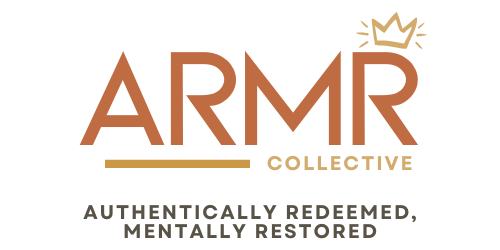That sinking feeling in your stomach when something’s off, but you talk yourself out of it anyway? I know it well. I spent months ignoring my own spiritual red flags because I thought being a good Christian meant giving everyone the benefit of the doubt.
I joke a lot that my spiritual discernment is broken and in desperate need of repair. I think it’s on the mend now, but this was not the case a few months ago. I kept trying to be friends with people who were terrible for me. I gave them chance after chance, getting more and more hurt each time I extended grace. I ignored every red flag, dismissed that uneasy feeling in my stomach, and convinced myself I was putting others before myself like Jesus did. When in fact, I was being taken advantage of and walked all over.
Sound familiar?
Maybe you’ve been here too—trusting people you shouldn’t, ignoring your gut instincts, and then wondering why you keep getting hurt by the same types of people.
The Crisis of Spiritual Confidence
For those who may not be familiar with what discernment is, it’s one of the spiritual gifts bestowed upon us by the Holy Spirit. Discernment is the ability to determine between truth and lies, good and evil, and God-breathed words and false teachings. It’s the ability to understand God’s will and discern between the Holy Spirit and deceptive forces.
I’d venture to guess a lot of us doubt our own discernment. Today’s church culture tends to elevate “spiritual leaders” over those who have a personal relationship with God. We look up to the leaders of the church to be all-knowing and “closer to God”. If we discern that someone is spreading lies disguised by Biblical verses, we may be afraid of appearing rebellious or unteachable as was the case with my own personal experience with spiritual abuse. Manipulation was disguised as spiritual guidance, and the line between submission to God and spiritual abuse was blurred.
My journey of broken discernment started last year. I kept trusting the wrong people, giving them chances when I should’ve drawn a boundary. I ignored red flags and dismissed my gut feelings. I thought I was extending grace and forgiveness but I was being taken advantage of. I also kept seeking outside validation instead of trusting my own thoughts, something I’m still working on. When the time came when my husband and I experienced spiritual abuse, my discernment switch seemed to finally switch on and I was able to trust my instincts to realize what they were saying was wrong.
What Biblical Discernment Actually Looks Like
In John 10:27, Jesus says, “My sheep hear my voice, and I know them, and they follow me.” This tells us that we are all able to discern and hear His voice and use this gift of discernment.
Discernment Is Not:
Blind submission to anyone claiming spiritual authority. As Paul writes in 1 Thessalonians 5:21, “…test everything; hold fast what is good.” We are called to test anything and everything to make sure it is from God. This isn’t rebellion or doubt; this is healthy discernment.
We also shouldn’t accept everything labeled as “from God” without question. In my own experience, I was told that God was telling other people things to tell me. I was able to discern that this seemed strange as I hear from God regularly; why wouldn’t He tell me Himself?
Discernment isn’t feeling guilty for having spiritual red flags. We need to stop apologizing for our spiritual instincts. If someone claiming to speak for God makes you feel uneasy, confused, or afraid, that discomfort is information worth paying attention to.
Discernment Is:
Your God-given ability to sense spiritual truth versus deception. The Holy Spirit’s guidance works through your renewed mind to help determine what is Truth and what is not. 1 John 2:20 says, “But you have an anointing from the Holy One, and all of you know the truth.” We can all tap into the Holy Spirit and our gift of discernment. Some people’s discernment may be stronger than others, and that’s okay. We are all still able to access the spiritual gift if we’ve renewed our minds. Romans 12:2 says, “Do not conform to the pattern of this world, but be transformed by the renewing of your mind. Then you will be able to test and approve what God’s will is—His good, pleasing, and perfect will.”
Red Flags Your Spirit Can Recognize
When “God’s Voice” Doesn’t Sound Like God
God’s voice brings peace, even in correction. If something creates fear, shame, or guilt, it isn’t of God. Conviction is very different from condemnation. My best friend and I call it the “spotlight from Heaven”. Conviction should bring realization and change, not shame and guilt.
God also gives wisdom and time to process. If something is demanding immediate compliance or acts with urgency, it isn’t God. God is generous with giving us time to properly process. He is so patient with us, even when we should probably be shaken and told, “WHAT ARE YOU WAITING FOR?”.
If someone claims exclusive access to God and bypasses your direct relationship with God, this is a major red flag. As I spoke before about my spiritual abuse experience, I was told that God was speaking through someone else instead of to me directly. If I had never heard from God myself, it would’ve been easy for me to fall into the trap of believing this person’s so-called God-breathed words. And if someone uses harsh, condemning, or manipulative words, this isn’t from God. These attributes directly contradict God’s character.
Manipulation tactics can also disguise themselves as spirituality. Common phrases are: “God told me to tell you…”, “If you reject this, you’re rejecting God”, “You’re not spiritual enough to hear this yourself”, or using past confessions as weapons.
Physical Reactions to Deception
Your body usually knows before your mind catches up. When someone is manipulating you, you might notice tension in your shoulders or jaw. Maybe you feel a knot forming in your stomach. I used to dismiss these as anxiety, but now I’ve learned to pay attention when my body physically rejects what someone is saying, even if it sounds “spiritual”.
God’s voice should bring clarity, even when the message is challenging. Deception creates fog and confusion. You’ll start to think in circles and second-guess things you used to be sure about. Or maybe you think you need to figure out what God “really” means. True spiritual guidance doesn’t leave you more confused than when you started.
When God corrects or redirects us, there should be an underlying peace even in the difficult message. Like a loving parent’s discipline. If something creates anxiety, panic, or that sick feeling of “what if I’m wrong”? It’s most likely not God’s voice. Spiritual guidance should never leave you feeling afraid, pressured, or spiritually inadequate.
Cultivating Healthy Spiritual Discernment
Knowing the spiritual red flags can be hard if you haven’t heard from God yourself, so I encourage you to practice. It turns out He wants to speak to us. My go-to is to sit in a quiet place and close my eyes with my hands upturned. I pray over and over for the Holy Spirit to speak to me. I also will journal in my prayer journal, and this is where I hear God speaking to me, and I write it all down. Sometimes, He will literally guide my hand which I know sounds crazy, but it’s true!
God’s voice will always align with Scripture. He will also always point to Jesus, not human intermediaries. True spiritual guidance builds your relationship with God, rather than creating dependency on the person giving the guidance.
Practical Steps for Testing Spiritual Input
Here’s a series of questions you can ask yourself when trying to decide if something is from God:
- Does this align with God’s character revealed in Scripture?
- Does this bring peace or create fear/confusion?
- Does this encourage my direct relationship with God or create dependency on others?
- What is the fruit of following this guidance?
- Do other mature believers confirm this direction?
Beyond these questions, there are practical habits that strengthen discernment.
Something I’m working on is spending more time in the Word. I know, literally every Christian says to spend time reading the Bible, but where do you even start? Here’s my recommendation—Paul is the best; he gives out hard truths unapologetically and really shines a spotlight on issues I didn’t even realize I had. So, literally anything written by Paul is a great place to start! (Romans, Galatians, Colossians, anything ending in “-ans”!) Once you’re familiar with the Word, it’s easier to decipher if something aligns with it or not.
Personal prayer and listening is also essential. Try getting a prayer journal. Start writing your prayers down and see if you hear back. It’s still wild to me that I usually get a response!
And we need to learn to recognize God’s peace as confirmation. When we hear back from God, our souls should feel peace, not fear.
When Others Question Your Discernment
I’m still learning to trust in my discernment. It’s easy for me to gather opinions and advice and then merge them all together to create my “own” opinion. Sometimes, I worry, “But what if I’m wrong?” But I’m encouraged to stand firm in my spirit-led convictions. Key word here is spirit-led! An easy trap to fall into is confusing spiritual discernment with personal preference or obligation. This is why quiet time reflecting or reading the Bible is so important. We need to be sure what we’re discerning is truly from the Holy Spirit.
My Journey from “Broken” to Trusting My Discernment
Looking back, I realize my discernment was actually working perfectly. When I first met one particular friend, something felt off. When I kept giving her second chances, even when people were telling me not to, I gave into the “easier” option of trying again. When the spiritual abusers reached out, I felt uneasy. But instead of trusting those feelings, I talked myself out of them. My discernment was screaming—I just wasn’t listening.
There’s a huge difference between not having spiritual discernment and not trusting the discernment you have. I thought I was discernment-challenged, but really I was confidence-challenged. The warning signs were there. I just kept overriding them with my head instead of trusting my spirit. I had the gift; I just didn’t believe in it.
Seeking everyone else’s opinion first damaged my confidence in my own instincts. I’d ask everyone what they thought about a certain situation before sitting by myself and figuring out, “what do I think about it?” By the time I’d gathered all the external opinions, I’d completely lost touch with my own inner knowing. I treated my discernment like it was broken instead of treating it like a muscle that needed strengthening.
And I also kept confusing being “Christ-like” with ignoring red flags. I kept giving people second chances when I should’ve drawn a boundary like my spirit said. I thought I was being like Jesus in assuming the best about people even when their behavior suggested otherwise. So when my spirit said, “something’s wrong here”, I’d override it with “yeah, but they said they’d change” or “maybe I’m being too harsh”. I was so afraid of being judgmental that I became spiritually naive. And if we look at Jesus, He had some pretty strong discernment about people’s motives and so should we.
Moving Forward with Confidence
But enough about me! How can we move forward with strengthening and trusting our discernment? We can pray each morning for discernment. It doesn’t have to be anything crazy complicated or elaborate. Something simple like, “Lord, please help me with discernment today. Help me to recognize what is You and what is not. Strengthen my discernment and help me build confidence to trust my instincts.”
Here’s where I tell you again to read your Bible (I’m also telling myself!). If we become familiar with the Bible, then we will have a better baseline for God’s voice. We also need to trust our spirits when something feels off. This isn’t to say we can’t ever ask people for their advice or guidance. We can still seek wise counsel while maintaining our spiritual authority. I ask my husband all the time for his take on a situation while also keeping what I discerned at the front of my mind. And we usually come to the same conclusion!
I know this journey of trusting your discernment again isn’t easy, especially if you’ve been hurt by people you trusted. It takes time to rebuild that confidence.
That sinking feeling in your stomach? Maybe it’s been trying to protect you all along.
Here’s what I want you to remember: You CAN trust your spirit-led intuition.
The same Holy Spirit who raised Jesus from the dead lives in you. The same Jesus who promised His sheep would know His voice is speaking to you directly. You don’t need permission to trust what God has already given you—the gift of spiritual discernment.
Share a time when your spiritual discernment was spot-on, even if others questioned it. Or share a time when you should’ve trusted it and didn’t!



